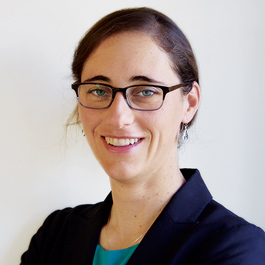
Former Senior Policy Advisor for US Ambassador US Mission
United Nations
Helping Map the Path to Global Sustainable Development
Genevieve Maricle’s first act of protest came at the age of five. When she learned that city developers were trying to build a highway through a popular park in her town, she went door to door to get the signatures necessary to oppose the project.
“This obviously wasn’t something I knew how to do, but my mom instilled in me both a deep respect for the Earth and the conviction that it’s our responsibility to stand up for it,” she says.
As a double major in math and environmental science, and president of Northwestern’s environmental group, SEED, Maricle was given the opportunity to attend the annual international climate change negotiations (COP 6) in the Hague, Netherlands in 2000.
“When I realized that there was this chaotic, fascinating world in which all countries—no matter their size or situation—can come together around a set of solutions, I knew I had found my place,” she says.
At the US Mission to the UN, Maricle supported US Ambassador Samantha Power in the lead-up to the COP 21 climate change conference in Paris. Prior to that, she negotiated and helped develop the 2015–2030 Sustainable Development Goals (SDGs), aimed at solving global challenges such as poverty, public health, conflict, and environmental sustainability.
Looking back at that experience, these are three groups whose engagement Maricle says will be crucial to the successful implementation of the SDGs:
The Thought Community
One of the most inspiring—and unconventional—aspects of the SDG negotiation process was its inclusivity. The UN held thousands of conversations with stakeholders in every part of the world. It was complex, but it brought a range of new ideas and players to the table. The predecessor to the SDGs, the Millennium Development Goals (MDGs), relied primarily on governments and development organizations for their implementation. The SDGs will rely on a great many more partners—from academia and think tanks to the private sector and individual citizens.
Innovative Individuals
One of the things we most need as implementation gets underway are ideas for what individuals can do to help achieve the SDGs. In some areas, the answer is clear cut—an individual knows how they can make their home more energy efficient, for example. But in other areas—inequality, community food security, global health—the actions are not as obvious. The good news is that good ideas can come from anywhere. We will better understand resilience when we turn it into a movement of individual actions.
The Private Sector
Realizing the ambitions of the SDGs will require corporate involvement—beyond corporate social responsibility and into action around the bottom line. Deeper corporate engagement needs to be about making investments that have embedded social impact. Water is a good example. If you look at Coca-Cola, clean, affordable water is central to the company’s business model and to the needs of communities across the developing world. Efforts like this will continue to have enormous impact, as private investment is poised to outpace that of the public sector.
* Editor's Note, November 2022: Genevieve Maricle is now Senior Advisor of Climate and Environment at USAID.